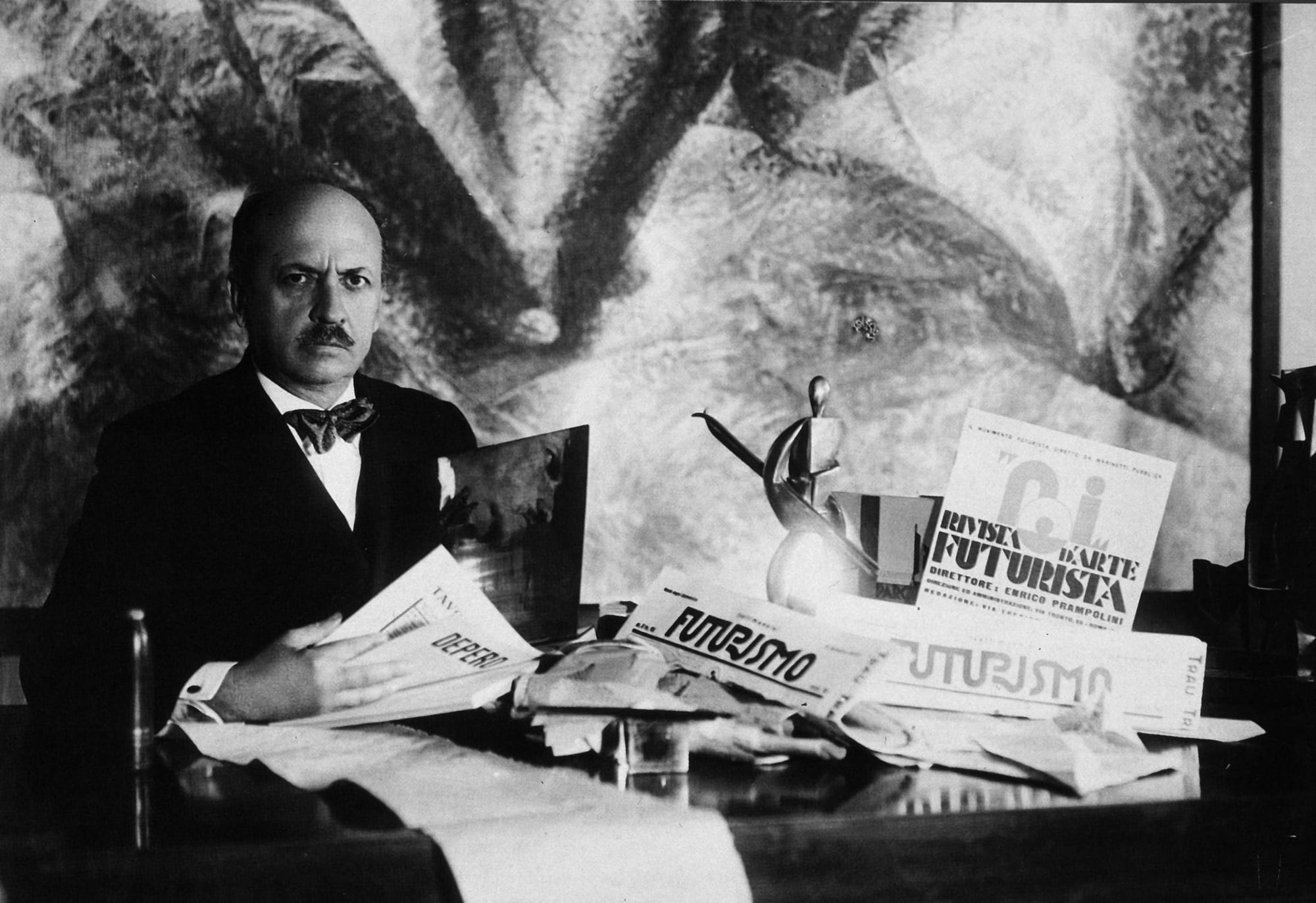
The Futurist movements of the early 20th century believed in the beauty of aggression and the valorization of power and energy for their own sake.
Italian Futurism was founded in 1909 by the poet Filippo Tommaso Marinetti, with the publication of his "Futurist Manifesto" in the French newspaper Le Figaro. The Anglo fork of Futurism was known as Vorticism, led by Ezra Pound and Wyndham Lewis. Italian Futurism was more explicitly political and militaristic, while Vorticism was more strictly aesthetic, concerned mostly with modernizing British art.
As Daniel Miller puts it in "Back to the Futurists," the lead essay of IM-1776 #5:
"Futurism was fundamentally anti-conservative and pro-dynamism rather than Leftist or Rightist. The point was to attack mediocrity and intensify dynamism by any means necessary. Marinetti's militant nationalism slotted into this paradigm through the conjecture that the nation presented the supreme political structure for maximizing and channeling energy."
Futurism was a unique ideological mix that favored muscular technological acceleration but also the conservation of traditional virtues and prohibitions. Marinetti advocated for "liberty, health, physical and intellectual improvement, strength, progress, greatness..."
Futurism was an aesthetic and political response to novel technological possibilities, especially electricity and wireless communication. As Miller notes, Ezra Pound believed the Russian Revolution owed its success to Marconi (the electrical engineer known for developing wireless telegraphy AKA radio). Lenin himself once said that "Communism is Soviet power plus electrification."
If the Left response to these possibilities was Communism, the Right response was eventually Fascism. But somewhere in between—or off the grid altogether—was Futurism. It was a short-lived paroxysm of vitality that ultimately died through a complicated submergence into its right-wing pole. As Miller aptly narrates, Marinetti's exciting but tenuous notions become impossibly contradictory and hopeless as they begin to mix with Mussolini's.
From our perspective, the critical mistake of Futurism was to seek centralized national power, which destined it to partnership with tyrannical control systems. The spirit of Futurism, we believe, will manifest differently at the level of small, elite, voluntary tribes operating on the next civilizational Operating System.
What electricity and radio were to the Russian Revolution, blockchains and Zero-Knowledge Proofs are to the next great American revival.
We expect to see small, elite, financialized tribes whose cognitive and economic circuits operate exclusively on immutable, decentralized, and verifiably secure technological rails. In this new context, the Futurist tribe would have no reason to partner with dubious national structures. Corrupted national structures will be left behind, or evolve into high-performance institutions due to accelerated competition on the Outside.
Consider even military functions. Today small, elite warrior tribes (private military corporations or PMCs) are in many situations obviously superior to bureaucratic American forces—more effective, faster, and cheaper. To fix ideas, take the case of Sierra Leone in the 1990s, as told by Erik Prince, also in IM-1776 (online):
"After Liberian warlord Charles Taylor sponsored the Revolutionary United Front (RUF) in Sierra Leone in the late ’90s, the RUF quickly captured most of the country, particularly the diamond-rich areas of the north... Into this maelstrom entered Executive Outcomes (EO), a South African PMC... Using mostly equipment abandoned by Sierra Leone’s disintegrated army, within 6 months they’d retaken the country and restored peace and order to the extent that free and fair elections could be held 3 months later.
EO was sponsored by an association of diamond miners who wanted their mines back. This group was willing to sponsor an ongoing 30-man EO presence to retrain a new Sierra Leone armed forces while providing a backstop in case the rebels returned. Susan Rice, then Bill Clinton’s Assistant Secretary of State for Africa, vetoed this proposal: 'We don’t want any white mercenaries in Africa,' she declared. The result? Within months the RUF and a new group called the West Side Boys had returned, killing, looting, and pillaging the country. 11,000 UN Peacekeepers at a cost of $1B+ per year in 1990s US dollars were now deployed. But they didn’t solve the problem, and not until the British SAS killed hundreds of rebels during a large hostage rescue mission of Irish Peacekeepers did the country start to stabilize."
In this case, the US government vetoed a patently superior option in favor of naked grift by the global Managerial Class. But what if anyone could hire that elite tribe without the approval of any third party, and the UN Peacekeepers had to compete with that tribe?
Today this is hard to imagine, because the globe’s technological rails are exceedingly fragile and politically conditioned. But what happens when every computation and transaction are self-sovereign, provably secure, and immutable? Private military companies could take debt or VC to launch the campaign itself, run all operations securely, establish verifiable rule of law, own and govern the territory itself de facto, and pay back its financiers all without any intermediaries or third-party veto points.
That is the spirit of Futurism. To "attack mediocrity and intensify dynamism," indeed. The "supreme political structure for maximizing and channeling energy" is not the militaristic nation-state but the decentralized, autonomous, and financialized tribe.
